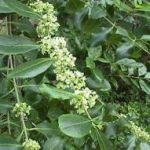| Common Name: |
Qat |
| Other Names: |
Khat, Arabian tea, bushman's tea |
| Botanical Name: |
Catha edulis |
| Genus: |
Cathus |
| Family: |
Celastraceae |
| Native Location: |
E Africa, the Horn of Africa, S Yemen |
| Cultivation: |
Well-drained to dry soil in sun. |
| Propagation: |
By seed sown when ripe. |
| Harvest: |
Twigs are picked all year round and used fresh within 24 hours. |
| Height: |
15m (50ft) |
| :Width |
6m (20ft) |
| Hardiness: |
Z10 |
| Parts Used: |
Leaves. |
| Properties: |
A bitter, astringent, stimulant herb that suppresses the appetite. |
| Medicinal Uses: |
Leaves are chewed or infused as a stimulant. Internally for malaria, coughs, asthma and other bronchial complaints, and to improve mental function in old age (Africa). Taken as an aid for weight reduction in Germany. Excess raises blood pressure and causes headaches, arrhythmia, hyperthermia, or other side-effects; persistent use may result in aggressive behavior and personality disorders. |
| Culinary Uses: |
Leaves are brewed as tea and are an ingredient of tej, an Arabic mead. |
| Warning: |
This herb is illegal in many countries, including Canada, France, Italy, Morocco, Norway, Sweden, Saudi Arabia, and the United States. |
| Bibliography: |
Encylopedia of Herbs by Deni Brown Copyright ©: 1995, 2001 Dorling Kindersley Limited pg 158
|

